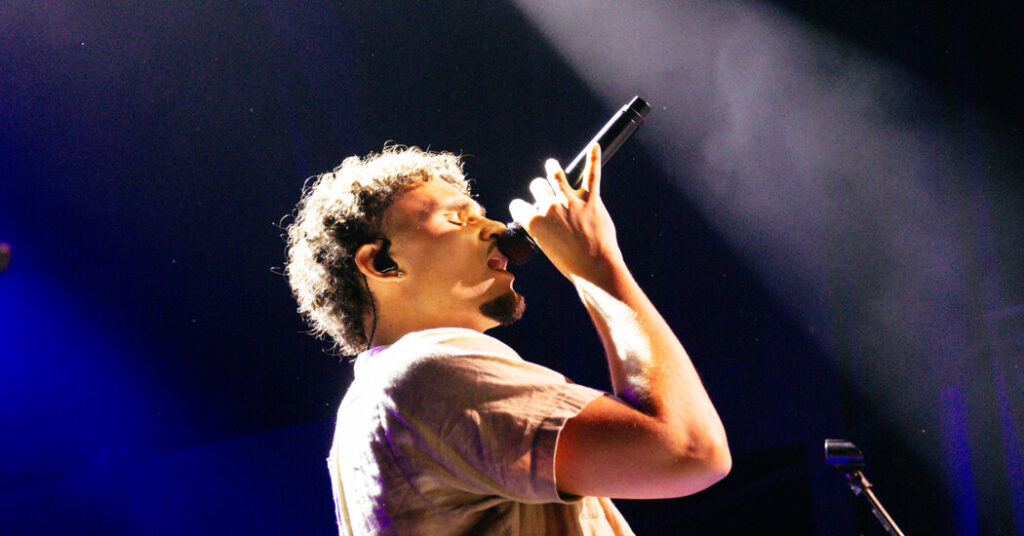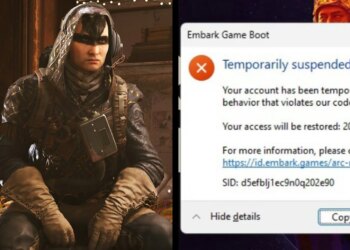Midway through a recent concert at the Gramercy Theater in Manhattan, a country pop star based in Nashville paused between songs as a roadie lugged a basketball hoop onstage.
Adrien Nunez, the singer, tossed a ball into the crowd and invited fans to take a couple of shots as he told the story of how he learned to play ball on the playgrounds of Brooklyn. He wasn’t referring to pickup games at recess. Until just a couple of years ago, basketball, not singing, was going to be his pathway to stardom.
Instead, there he was onstage last month, with a microphone and a band, serenading the audience, many of them singing along and cheering while he twirled his athletic, 6-foot-6 frame across the stage.
The novelty hoops moment was brief, but it underscored the central mystery surrounding the improbable rise of one of Nashville’s hottest new singers. How did a New York City-born basketball star who steadfastly ignored country music for most of his life turn into a countrified heartthrob almost overnight?
“I enjoy the singing a lot more than the basketball,” Mr. Nunez, 26, said from his family home in Crown Heights, Brooklyn, hours before the concert at the Gramercy. “Someone’s not trying to take your head off.”
From playing regularly before sold-out arenas filled with rabid University of Michigan fans to headlining a 15-city North American tour, Nunez navigated a remarkable pivot. His debut single, “Low Road,” a duet with Avery Anna that is saturated with melodic hooks, has more than 40 million streams on Spotify alone since its release last year. His entry into the music industry was so bafflingly unorthodox that it was almost accidental; he became hugely popular on social media as the Brooklyn-born shooting guard who is half-Dominican, belting out other people’s hits while sitting in his car, and then decided to write a tune of his own.
“This song changed my life,” he told fans at the Gramercy, and his band launched into “Low Road” as the audience erupted.
Mr. Nunez’s parents watched from the back of the club, while his grandmother, who had flown in from the Dominican Republic to see the show, stood at the railing in front of the stage, holding firm amid the jostling 20-somethings reaching out to her grandson. Mr. Nunez’s youth basketball coach from Brooklyn watched from the seats above.
“This is so weird for me,” Martin Nunez, Adrien’s father, marveled aloud during the set. He had watched his son play basketball on national TV, but it was the first time he had seen him headline a concert.
But in some ways, it made perfect sense. It was music, after all, not basketball, that was encoded into his genes.
His mother, Jenny Lessard, a jewelry designer, grew up with five sisters who all played instruments. Their father was a classical composer, their mother was a trained singer and music was a constant in their Long Island household.
“There were scales coming out of every room,” she said.
Adrien’s father, who came to New York from the Dominican Republic as a teenager, played bass in several bands in the 1990s and early 2000s, including Espuelas de Bronce, a Spanish-language alternative rock band. His father’s day job was as manager of the produce department at the Gourmet Garage in SoHo, until 2005, when he and a partner opened Union Market, a chain of high-end grocery stores in Brooklyn and Manhattan.
The family moved from the Lower East Side to Brooklyn when Adrien was about 10. As a child he studied drums and guitar in the style of heavy metal bands like Metallica and Pantera. He was also a skateboard kid, and like many of the boys in his new neighborhood, a video game addict, to the point that he held a relatively high ranking in the war game Call of Duty. By the time he was 12, his parents were so concerned about screen time that they devised a plan. For every hour spent on a screen, he had to do an hour of another activity.
Until then, he had never even picked up a basketball, but his dad took him to a nearby schoolyard, and just as with music, Adrien was a natural. He would eventually play for Millennium High School in Manhattan, then Bishop Loughlin in Brooklyn and finally a post-grad year at St. Thomas More, a prep-school basketball powerhouse in Connecticut, before entering Michigan in 2018.
In college, he was playing with and against some of the best players in the country, but he was relegated to a minor role in games. His grand ambition was to play in the N.B.A., and the dream seemed to be fading, minute by minute on the bench. But unlike many frustrated athletes, Mr. Nunez stayed put.
“Logically, the thing you would do in that situation is transfer,” he said. “But I just loved Michigan.”
While there, he began experimenting with TikTok, producing amusing videos, including some messing about with teammates. One early post had 3.1 million views, and soon he gained more fame for his social media posts than for basketball. But Juwan Howard, the Michigan coach at the time, said it never interfered with the team or the games.
“He always worked hard, never complained and brought light to the team,” said Mr. Howard, who is now an assistant coach with the Brooklyn Nets.
Part of that light came from Mr. Nunez’s voice. He sang in the shower, at his locker and on the team bus. Mostly it was R&B tunes, sometimes hip-hop, heavy metal or punk. But never country.
“I was from New York City, so it’s like a joke,” he said. “You like everything but country.”
That barrier finally fell when a teammate sneaked a country tune into the mix, and it wormed into Mr. Nunez’s ear. It was Morgan Wallen’s version of “Cover Me Up,” by Jason Isbell. That was the seed, he said, and as basketball withered, the seed sprouted.
During weekly drives to the mall with Brandon Johns Jr., a Michigan teammate now playing professional ball in Europe, they would sing loudly. Mr. Johns recalled in a telephone interview from Lisbon how he eventually noticed that his friend was getting legitimately good.
“We would analyze each other’s voices and how to execute a note,” Mr. Johns said. “Now the whole world can see his talent.”
Mr. Nunez headed to Los Angeles after graduation in order to advance what was becoming a lucrative career as a social media influencer, though he had not totally given up the dream of playing pro ball. When he was offered a chance to play in the top professional league in the Dominican Republic, he warily accepted. It was a disaster.
He arrived with a lot of hype as the No. 2 draft pick, but he was already making far more money as a social influencer than any other players or coaches. He was assigned to live in ramshackle team housing that felt more cramped than a freshman dorm, so he found better accommodations for himself. Then he would fly off to Miami for video shoots and zip back in time for games and practices. His teammates, many of them older and with families, resented him, and Mr. Nunez felt like a target on the court. It was unhealthy, he said, so he left, and left the sport behind for good.
“I didn’t even want to see a basketball,” he said. “You pour your whole life into something and it doesn’t work out. There was anger and disappointment.”
Back in the United States, Mr. Nunez returned to singing in cars and posting high-energy videos belting out other artists’ tunes, which racked up millions of views worldwide on TikTok. It was a strange kind of success: Record labels paid him handsomely to post videos of himself singing their artists’ songs.
He moved to Nashville and posted scores of these car videos. And then he noticed something interesting: The country music community was the most receptive to his loud, energetic renditions.
“They’re seeing a mixed kid singing country,” he said, “and thinking, ‘This is weird, why is he screaming country, and he’s from New York and he’s a basketball player.’ It didn’t make sense. But the songs were good, and people liked the energy.”
But Mr. Nunez thirsted to make his own music. He had things to say and feelings to express, some joyful, but others saturated with pain.
“I needed a creative outlet,” he said. “I wanted something to feel proud of.”
Through his new connections with the record labels, he was introduced to country producers and artists, like the singer and strummer Zach Stein, known as Steinza, who invited him into studios and helped him write songs like “Low Road” and his new single, “Over Again.”
Mr. Nunez is signed with Warner Records and is working on a new EP and an album scheduled for release next year. In addition to his own club tour, he opened for the country star Luke Bryan, and he found himself singing in the same 20,000-seat arena in Orlando where he once played basketball.
Back then, jogging onto the court for pregame layups while the band played the Michigan fight song was an exhilarating feeling. Being onstage singing his own songs is even better.
“I’m right where I’m supposed to be,” Mr. Nunez said. “Music was my first passion. I got away from it, but it found me again.”
David Waldstein is a Times reporter who writes about the New York region, with an emphasis on sports.
The post The Basketball Star Who Accidentally Became a Country Music Heartthrob appeared first on New York Times.




